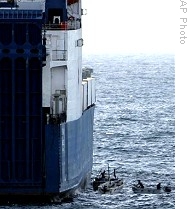VOA标准英语10月-Report Urges Global Action to Curb Piracy in Soma(在线收听)
 |
| Photo released by the U.S. Navy shows Somali pirates in small boats alongside the hijacked 'Faina', 28 Sep 2008 |
The Chatham House report says the international community is not doing enough to stop piracy in Somalia, even though pirate activities are threatening global commerce and economies.
Each year, some 16,000 vessels pass through the Gulf of Aden, a narrow waterway between Somalia and Yemen that connects Europe to the Far East. The report says pirates this year have seized more than two dozen of those ships in the Gulf of Aden and about half a dozen others in waters off Somalia's east coast, earning them as much as $30 million in ransoms.
Facing soaring insurance premiums, ship owners are said to be considering taking the much longer route around the Cape of Good Hope in South Africa to move their goods. The extra transportation and fuel costs would then be passed on to consumers, causing even more economic hardships for many people around the world.
The report notes that the presence of a maritime force composed of U.S. and allied warships in the region has done little to deter pirates, who are better armed and more determined than ever before. Pirates are now using rocket-propelled grenade launchers to try to hijack bigger vessels and that has sparked fears that an attack on an oil tanker could cause a major oil spill some day in the Horn of Africa.
For months, ship owners have appealed for greater international action to curb piracy in Somalia. The director of the International Maritime Bureau, Pottengal Mukundan, says he believes many more warships need to be deployed.
"The reason why these attacks have increased dramatically is because there has been no robust push-back against these pirates," he said. "They are operating with impunity. What we need is a firm push-back and the only people who can provide it are the naval forces. There is no one else."
The author of the Chatham House report, Roger Middleton, agrees that a strong international military presence and response could reduce the number of pirate attacks. He welcomed the European Union's announcement on Tuesday that three additional warships, a supply ship, and three naval surveillance planes could be sent to Somalia as early as next month.
But Middleton says he believes that is only a part of the solution to the piracy problem there.
"Even with 100 ships, you are still not going to have full coverage of the whole Indian Ocean coast of Somalia and the Gulf of Aden," he said. "This is a huge area. So a large military presence, while important and would act as a deterrent, it is not an ultimate solution."
"The international community needs to realize that Somalia is not a normal country. This is a failed state and you have to treat it as such. You have to look at the type of solutions that we have for Somalia and that might mean accepting Somali solutions like the Islamic Courts Union need to be accommodated in the future government of Somalia," he added.
The only time in the past decade when piracy was not a problem in Somalia was in 2006 during the six months the Islamic Courts Union was in power in Mogadishu. Middleton argues that leaders in the courts were able to stamp out pirate activities because they enjoyed popular support and were seen as legitimate authorities. He notes that piracy returned with a vengeance after Ethiopia, with U.N. backing, intervened in Somalia and replaced the courts with a secular government that lacked a popular mandate.